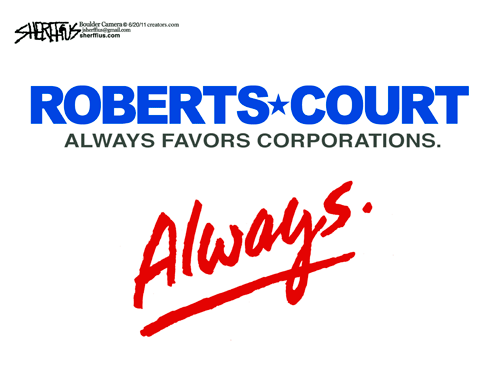The latest session of the US Supreme Court is coming to a close with several decisions handed down since last Thursday, that peaked today with several rulings handed down. The “grand finale” will be this Thursday when the court announces its decision on the constitutionality of the Affordable Care Act. The media has been focused mostly on today’s ruling that gutted three quarters of Arizona’s controversial immigration law, S.B. 1070. The overturn of a 100-year-old Montana state law that banned corporations in that state from spending any of their corporate cash to support or oppose a candidate or a political party and the ruling that struck out any requirement that life without parole be the mandatory penalty for murder by a minor got second and third billing.
What the media chose to ignore was last Thursday’s 5 -4 decision in Knox v. Service Employees International Union (SEIU) that dealt a blow against public sector labor unions and in favor of employees who are represented by a union but are not members:
The case has three holdings: (1) When a public-sector union imposes a special assessment or dues increase, the union must provide a fresh Hudson notice (the Court’s vote on this issue was seven to two); (2) the union cannot require nonmembers to pay the increased amount unless they opt in by affirmatively consenting (vote of five to four); and (3) the case was not rendered moot by the union’s post-certiorari offer of a full refund (unanimous).
So what you say? Why is this an important ruling? It’s important because it requires Unions to do something that corporations aren’t. It requires unions to get permission from their non-members, who pay fees so they are covered by SEIU-negotiated contracts, before that money can be used for political spending. Instead of the traditional “opt-out”, the now have to “opt-in.” Corporations are not required to get share holders permission to spend millions on a political campaign. This could significantly impact on labor’s ability to fight back against corporations in the political arena. It restricts the union’s First Amendment rights to spend unlimited amounts under the 2010 Citizens United ruling:
“The court’s opinion makes clear its displeasure with 60 years of precedent on the dues issue, which have placed the burden on employees who object (to political spending) to opt out,” said William Gould, who from 1994 to 1998 chaired the National Labor Relations Board, the federal agency that governs labor relations in the private sector. “This decision is an invitation to litigate this issue.”
Although the Knox case involved special assessments on non-union members, Gould said, the Supreme Court’s reasoning suggests that it could be applied to all union dues that fund political spending paid by non-members. The next time that a union goes through the standard process of notifying non-members they have the ability to opt out, the union may well be met with a legal challenge, warned Gould. “(This decision) indicates that if these five (justices) are there when these cases come back to the Court, that the Court will decide these cases adversely to unions,” he said.
That thought has the National Right to Work Legal Defense Foundation, which represented the plaintiffs in the case, and similar groups celebrating — and labor advocates fearing the worst.
Patrick Semmens, vice president of the foundation, said via email that while some justices have used similar language in the past, the Knox decision confirms that now a majority believe “compulsory unionism” is a violation of First Amendment rights.
SEIU Secretary-Treasurer Eliseo Medina pointed out that while this complicates matters for unions it is “doable”. But he also noted that this decision was one sided in that “There is nothing in this [Knox] decision that even speaks to the question of shareholders, or corporations having to tell shareholders about any of the contributions they make, [..] “The language, to me, signals what has been the rightward drift of the Supreme Court … Now they’ve come up with a decision to make it more difficult for workers to be able to effectively participate in the [political] process.”
MSNBC host Rachel Maddow and her guest, legal correspondent and senior editor for Slate Dahlia Litwick discussed all of these rulings with emphasis on the Knox ruling.
As was expressed in it opinion on June 23, the New York Times rightly noted:
The conservative majority strode into the center of the bitter debate about right-to-work laws preventing unions in 23 states from requiring nonmembers to pay any union expenses, including those supporting collective bargaining that benefits nonmembers. It used this narrow case to insert itself into that political controversy when there was no reason to do so.


 Once again the corporate owned, conservative Supreme Court has
Once again the corporate owned, conservative Supreme Court has 

Recent Comments